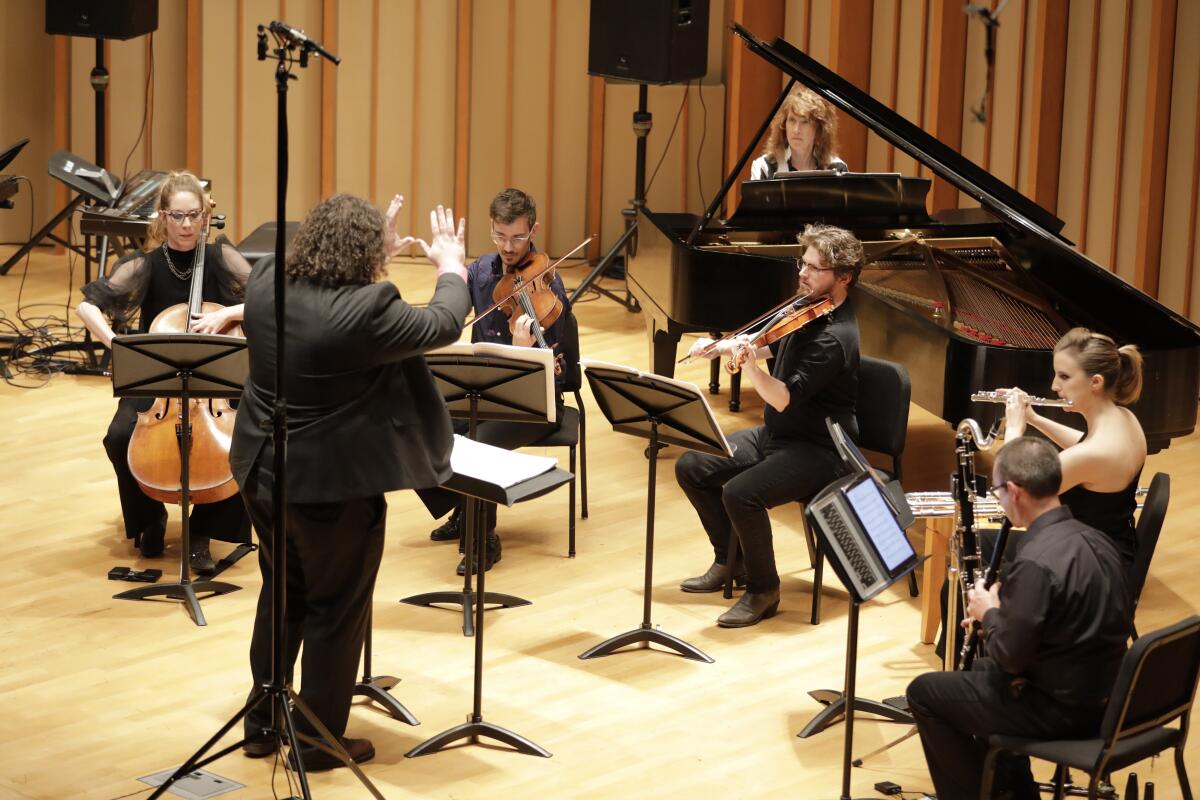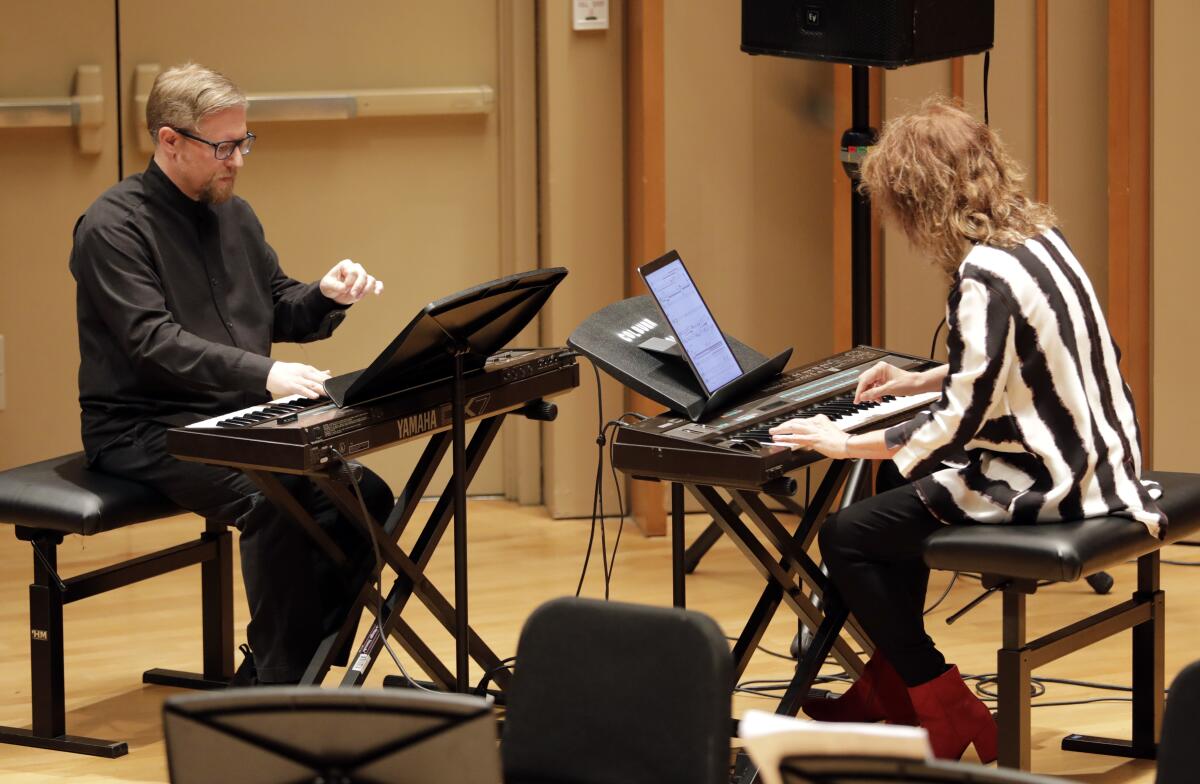Commentary: The once-scorned idea of an L.A. community of musicians has come to fruition

In 1987 the stubbornly prescient boss of the Los Angeles Philharmonic shocked the musical world when he called for the end of orchestras. Burn them, he said. They bore, bum out and burn out musicians. What we need are larger communities of musicians who take on a variety of musical tasks throughout their towns, playing early music, new music, movie music, chamber music, whatever is wanted. It was hardly surprising that a power-crazy Ernest Fleischmann was accused of nothing less than an L.A. Phil takeover of all music.
Equally unsurprising, Fleischmann has been proven at least somewhat right. The L.A. Phil has moved further in that seemingly megalomaniacal direction than any other orchestra, and in so doing it has liberated musicians and transformed great swaths of our city’s musical life. And there is no better time than now — with the L.A. Phil out of town wowing Mexico City, London and, let’s hope, Boston and New York — to recognize that, broadly speaking, the community of musicians has become our zeitgeist. It includes musicians themselves along with institutions.
Last weekend, for instance, the Pasadena Symphony and Los Angeles Chamber Orchestra seemed remarkably in sync. Saturday, Pasadena’s music director, David Lockington, opened his program at Ambassador Auditorium with Ellen Reid’s 15-minute “Petrichor.” Across town the next night at UCLA, LACO’s new music director, Jaime Martín, gave the West Coast premiere of Missy Mazzoli’s “Dark With Excessive Bright” in Royce Hall. Both works last 15 minutes and had their premieres in February 2018. The composers are in their mid-to-late 30s and are friends.
More than that, “Petrichor” was commissioned by LACO, where Reid serves as composer-in-residence. Last week Reid was announced as one of Lincoln Center’s “Emerging Artists,” my quotes because around these parts she’s well emerged, having had recent commissions from the L.A. Phil (two last season), LACO and Los Angeles Opera (which led to a Pulitzer Prize for her “prism”).
Of all that run, “Petrichor” may be her most successful piece (“prism” is saddled with a problematic libretto). Named for the fresh (and, to Angelenos, heavenly) smell of rain after a drought, “Petrichor” is for musicians placed onstage and behind the audience. In the warmly enveloping acoustics of the intimate Ambassador, the score’s mistily reverberant sonorities floated before a listener’s eyes and behind the ears with even more vibrancy than they had in Royce Hall last year.
Although the Ambassador audience seems more Caltech than CalArts, Lockington, by closing the program with a suave performance of Arturo Márquez’s popular “Danzón No. 2,” book-ended the program with former CalArts students. In between, Beethoven’s “Emperor” Concerto, dutifully played by pianist Alessio Bax, and flashy De Falla mainly served to demonstrate the Pasadena Symphony’s current excellence.
Mazzoli’s score is a double bass concerto with its own immersive elements. She was thinking of a very old instrument and created a sonic aerie of harmonic clouds in which old world meets new, evoking the churchy reverberance of Medieval and Renaissance choral music and, in the solos, Baroque danciness given splendid character by the principal bassist, David Grossman.
Martín built his program around 20th-century composers engaging in the past: Ravel’s “Le Tombeau de Couperin,” Stravinsky‘s “Pulcinella” Suite and Prokofiev’s “Classical” Symphony conducted as though more fun than that last. This was Martín’s second concert as music director, so the community of musicians may still be new to him, but he is making friends fast.
When it comes to individual musicians, well-known L.A. freelancers, much heard over the last two weeks, demonstrated just how a utopian musical society might work revolving around the cooperation and creativity that Fleischmann proposed. The pianist Vicki Ray had days earlier played a duo with Wadada Leo Smith at the trumpet player and composer’s UCLA Medal ceremony, then appeared in a Harry Partch concert the next night performing on a multi-tonal chromelodeon. On Tuesday night at Zipper Hall in downtown L.A., she opened this year’s Piano Spheres series with her own program.
Piano Spheres is a community of pianists, formed a quarter century ago by Leonard Stein and his five most talented students. Having served the personal harmonic needs of Smith and Partch, Ray chose to bring her own take on the French school of spectral composition that produces magnificently complex harmonies out of the acoustical phenomenon of overtones.

For this, she invited friends from the community of musicians to help. One was the pianist Aron Kallay, her former student who runs an imaginative new music series, Tuesdays @ Monk Space. Seated at a pair of 1983-vintage synthesizers, she and Kallay played Tristan Murail’s space-age duet, “Atlantys.” Ray followed that with a quirky, spacey duet she and Stephen Lehman cooked up for saxophone and a Yamaha piano/synthesizer hybrid.
The big event was an intense and brilliant performance of one of the most powerful spectral ensemble pieces, Gérard Grisey’s “Vortex Temporum,” where swirling sounds from a trio of strings, clarinet, flute and piano (four of its strings tuned a quarter tone flat) contrast with pitches whispered like puffs of reverberating air. Next week, Ray along with Piano Spheres colleague Gloria Cheng will be performing in the Monday Evening Concerts program at Zipper.
In the ensemble, conducted by Nicholas Deyoe (a guitarist and one of the founders of the ensemble wasteLAnd), were violist Andrew McIntosh and cellist Ashley Walters. They are both members of the RedKoral Quartet, which was formed to play Smith’s string quartets and which also appeared at Smith’s UCLA Medal ceremony. The first violinist of that quartet is Shalini Vijayan, whom Kallay brought to Monk Space for a recital program. In some of the most glorious violin playing I’ve heard this year, she included more new, unusual and microtonal music from the L.A. community of musicians, such as a seductive duet for violin and table by Reena Esmail, as well as a guest appearance by Walters in a new piece by Smith.
As for McIntosh, he brings it all together. He too is a member of the Partch Ensemble, playing a micro-tonally altered viola. He’s also a composer whose tantalizing opera, “Bonnie and Clyde,” has been workshopped by the disruptive L.A. opera company the Industry. He happens, as well, to play early music on a period instrument in a number of Baroque ensembles around town. One of them, Tesserae, has a big Bach event Sunday at Contrapuntal Recital Hall in Brentwood.
For that gig, McIntosh will perform with British soloist Thomas Dunford, dubbed the Eric Clapton of the lute, presumably a big multi-genre deal across the pond. But that may simply be all in a musically enlivening day’s work for this community of musicians.
More to Read
The biggest entertainment stories
Get our big stories about Hollywood, film, television, music, arts, culture and more right in your inbox as soon as they publish.
You may occasionally receive promotional content from the Los Angeles Times.











